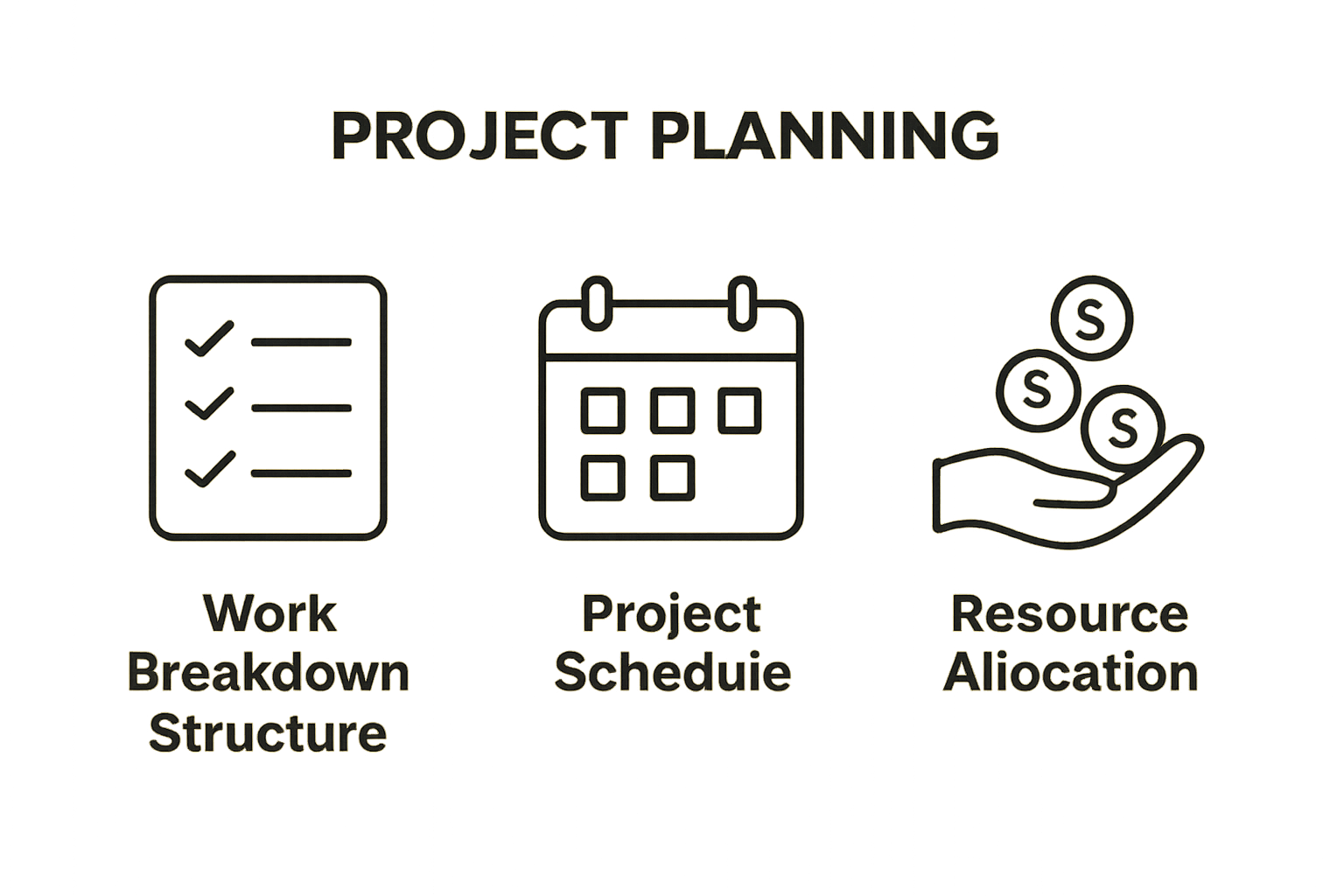Project planning shapes big ideas into real, measurable results for any team or business. Most people think planning is just about making lists and ticking boxes, but that overlooks a much bigger truth. Projects with strong planning are up to 80 percent more likely to finish on time and on budget. The real game is not about keeping projects moving, but about building a solid foundation that makes success almost predictable.
Table of Contents
- What Is Project Planning And Why Is It Important?
- The Core Components Of Effective Project Planning
- How Project Planning Contributes To Project Success
- Understanding The Various Types Of Project Plans
- Real-World Applications And Benefits Of Project Planning
Quick Summary
| Takeaway | Explanation |
|---|---|
| Project planning is essential for success | A structured approach leads to better organization, resource allocation, and project outcomes. |
| Define clear objectives and deliverables | Establishing specific goals helps align team efforts and track progress effectively. |
| Conduct thorough risk management | Identifying and mitigating risks beforehand prevents minor issues from escalating into significant problems. |
| Implement strategic resource allocation | Assessing and distributing resources wisely maximizes productivity and optimizes budget use. |
| Create tailored project plans | Adapting project plans to fit specific contexts ensures relevance and effectiveness in execution. |
What is Project Planning and Why is it Important?
Project planning represents the strategic foundation for transforming abstract ideas into tangible, achievable objectives. At its core, project planning is a systematic approach that helps teams define project goals, outline precise strategies, allocate resources efficiently, and create a roadmap for successful execution.
Understanding the Core Concept
Project planning goes beyond simple task management. It involves creating a comprehensive blueprint that anticipates potential challenges, identifies necessary resources, establishes clear timelines, and sets measurable outcomes. According to MITRE Research, project planning establishes the scope, schedule, resources, and critical risk factors that determine a project’s potential success.
Key elements of effective project planning include:
- Defining clear project objectives and deliverables
- Creating realistic and flexible timelines
- Identifying potential risks and mitigation strategies
- Establishing communication protocols
- Allocating human and financial resources strategically
Why Project Planning Matters
Successful project planning directly impacts an organization’s ability to achieve its strategic goals. Without a structured approach, projects can quickly become disorganized, overbudget, and fail to meet their intended outcomes. Effective planning helps teams:
- Minimize unexpected complications
- Improve resource allocation
- Enhance team collaboration and communication
- Provide clear accountability and performance metrics
- Increase the likelihood of project success
By investing time in thorough project planning, teams transform potential chaos into a structured, manageable process. Learn more about tracking your project’s progress with our comprehensive guide on project tracking strategies.
The Core Components of Effective Project Planning
Successful project planning requires a strategic approach that integrates multiple critical components. Understanding these elements helps teams create robust frameworks that transform complex initiatives into achievable objectives.
Fundamental Planning Elements
According to Sophia Learning, effective project planning encompasses six essential components that serve as the backbone of successful project management. These components work together to provide a comprehensive roadmap for project execution.
Below is a table outlining the six fundamental components of effective project planning, providing a clear summary of each element and its purpose.
| Planning Element | Purpose |
|---|---|
| Work Breakdown Structure | Breaks the project into manageable tasks and deliverables |
| Project Schedule | Establishes timelines and deadlines |
| Resource Allocation Plan | Details the assignment and utilization of resources |
| Detailed Project Budget | Outlines estimated costs and financial resources |
| Risk Management Strategy | Identifies potential risks and mitigation actions |
| Communication Protocols | Sets guidelines for team and stakeholder communication |
The key fundamental planning elements include:

- Work Breakdown Structure (WBS)
- Project Schedule
- Resource Allocation Plan
- Detailed Project Budget
- Risk Management Strategy
- Communication Protocols
Strategic Resource Management
Resource management is the critical nerve center of project planning. Teams must carefully assess and allocate both human and financial resources to ensure optimal performance. This involves identifying team capabilities, understanding skill sets, determining precise resource requirements, and creating flexible allocation strategies that can adapt to changing project dynamics.
Strategic resource allocation helps organizations:
- Maximize team productivity
- Prevent resource overload
- Optimize budget utilization
- Create realistic project timelines
- Minimize potential performance bottlenecks
By understanding and implementing these core components, project managers transform abstract goals into structured, achievable plans.
 Check out our comprehensive guide to project progress tracking for advanced insights into maintaining project momentum.
Check out our comprehensive guide to project progress tracking for advanced insights into maintaining project momentum.
How Project Planning Contributes to Project Success
Project planning is not merely a preliminary administrative task but a critical strategic process that directly influences project outcomes. By establishing clear frameworks and anticipating potential challenges, teams can significantly enhance their probability of achieving project objectives.
Enhancing Organizational Performance
According to University of Arizona Global Campus, project planning delivers five fundamental benefits that collectively drive project success. These benefits transform project management from a reactive to a proactive approach, enabling teams to navigate complex challenges with greater confidence and precision.
Key performance enhancements include:
- Improved project efficiency
- Better resource management
- Enhanced team communication
- Proactive risk management
- Increased customer satisfaction
Strategic Risk Mitigation
Effective project planning serves as a strategic shield against potential project failures. By systematically identifying, analyzing, and developing mitigation strategies for potential risks, teams can prevent small complications from escalating into major roadblocks. This approach involves creating comprehensive contingency plans, establishing clear communication channels, and maintaining flexibility in project execution.
Risk management through project planning helps organizations:
- Anticipate potential challenges
- Develop responsive strategies
- Minimize unexpected disruptions
- Protect project investments
- Maintain stakeholder confidence
By implementing robust planning strategies, project managers transform uncertainty into a manageable, structured process. Explore our advanced project tracking techniques to further enhance your project management capabilities.
Understanding the Various Types of Project Plans
Project plans are not one-size-fits-all solutions but sophisticated strategic documents tailored to specific organizational needs and project complexities. Understanding the diverse types of project plans enables teams to select the most appropriate framework for their unique objectives.
Comprehensive Project Management Plans
According to Boston University’s School of Public Health, effective project plans encompass multiple critical components that provide comprehensive guidance for project execution. These plans serve as roadmaps that outline every crucial aspect of project implementation, ensuring clear communication and structured progression.
Key components of robust project plans typically include:
- Executive summary
- Detailed staffing information
- Comprehensive scheduling
- Communication protocols
- Specific project activities
- Critical milestones
- Regular review processes
- Defined deliverables
Specialized Project Plan Categories
Project plans vary significantly based on industry, project complexity, and organizational requirements. Different project types demand unique planning approaches that address specific challenges and objectives. Some primary project plan categories include:
- Strategic Project Plans: Focus on long-term organizational goals
- Operational Project Plans: Address day-to-day implementation details
- Tactical Project Plans: Bridge strategic objectives with operational execution
- Software Development Plans: Tailored for technology and digital projects
- Construction and Engineering Plans: Specific to physical infrastructure projects
By understanding these diverse planning approaches, project managers can create more targeted, effective strategies.
The following table compares common types of project plans, highlighting their main focus and typical use cases to help you select the right plan for your project.
| Project Plan Type | Main Focus | Typical Use Case |
|---|---|---|
| Strategic Project Plan | Long-term organizational goals | Business growth initiatives |
| Operational Project Plan | Day-to-day implementation | Routine operational tasks |
| Tactical Project Plan | Linking strategy and operations | Short-term campaigns or initiatives |
| Software Development Plan | Technology and digital projects | Software releases or product builds |
| Construction and Engineering Plan | Physical infrastructure projects | Building, infrastructure, or renovations |
Real-World Applications and Benefits of Project Planning
Project planning transcends theoretical concepts, providing tangible benefits across diverse industries and organizational contexts. By implementing structured approaches, businesses transform potential challenges into strategic opportunities for growth and innovation.
Cross-Industry Project Management Impact
According to National University, project management delivers significant improvements in communication, customer satisfaction, risk management, and overall productivity. Organizations leverage project planning to ensure precise execution, cost control, and quality outcomes across multiple sectors.
Key industry applications include:
- Construction and infrastructure development
- Software and technology implementation
- Healthcare system improvements
- Marketing campaign management
- Product research and development
- Educational program design
- Nonprofit organizational initiatives
Strategic Organizational Advantages
Effective project planning provides organizations with comprehensive strategic advantages that extend beyond immediate project completion. By establishing clear frameworks, teams can optimize resource allocation, predict potential obstacles, and create more efficient workflows.
Critical organizational benefits encompass:
- Enhanced communication and team alignment
- Improved budget management
- Reduced operational risks
- Increased stakeholder confidence
- Systematic performance tracking
- Accelerated decision making processes
- Better resource optimization
By understanding and implementing robust project planning strategies, organizations can transform potential uncertainties into structured, manageable processes. Discover advanced techniques for tracking project progress to further elevate your organizational performance.
Turn Project Planning Knowledge Into Real Results for Your Business
Understanding how to plan a project is a powerful first step. Many beginners struggle with staying organized, keeping teams aligned, and translating project plans into measurable progress. If you are tired of lost time, unclear responsibilities, and overwhelming manual tasks, you are not alone. The article highlights how creating structured project roadmaps, tracking milestones, and improving communication are essential for avoiding chaos and achieving goals. Gammatica.com is built to solve these very pain points, making project execution easier from day one.

Take control of your projects starting now. By exploring Gammatica.com, you can automate redundant work, manage progress using Kanban boards, streamline team communication, and track time with ease. Get instant access to AI-powered suggestions, ready-made templates, and all-in-one tools that free up your schedule and bring your project plans to life. Ready to see real progress? Start organizing your projects and reclaim your time today.
Frequently Asked Questions
What is project planning?
Project planning is a systematic approach that helps teams define project goals, allocate resources, create timelines, and anticipate potential challenges to ensure successful project execution.
Why is project planning important?
Project planning is crucial because it minimizes unexpected complications, enhances team collaboration, ensures efficient resource allocation, and ultimately increases the likelihood of project success.
What are the core components of effective project planning?
The core components include defining project objectives, creating a work breakdown structure, developing a project schedule, allocating resources, managing risks, and establishing communication protocols.
How can effective project planning contribute to successful outcomes?
Effective project planning enhances organizational performance by improving project efficiency, resource management, team communication, and proactive risk management, leading to higher customer satisfaction and successful project completion.



